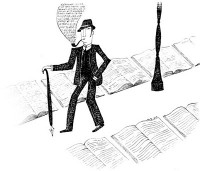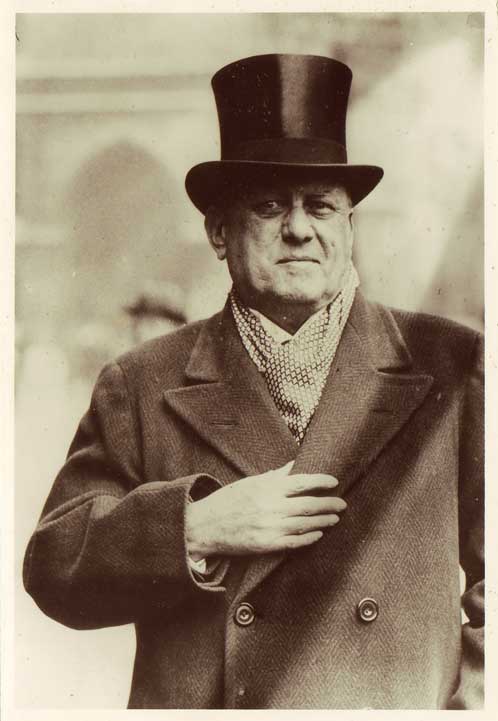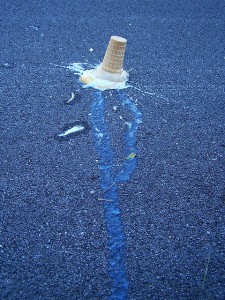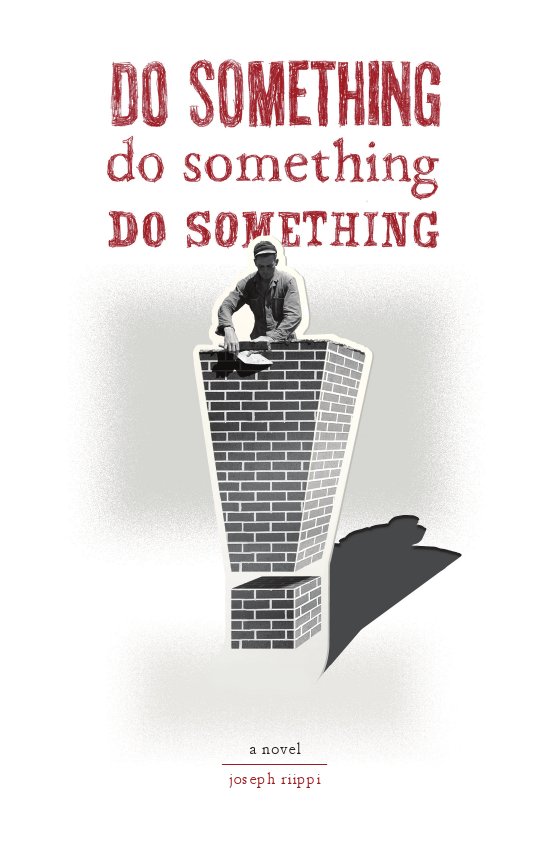The last Pindeldyboz. (And again I’m posting about a death.) Thanks to all the editors who worked there over the years. UPDATE: ‘Dja publish there at some point? Give us a link in the comments.
Splat in the Memory
This happened to my daughter, who is under 2, two weeks ago. She is still talking about it: “I-cream fell. I-cream. FELL. I. Cream. ISE. FELL.” When she wakes up, it’s one of the first things she says, and repeats, as though she’d relived the experience during her sleep. If something else falls, she mentions the ice cream fall again. It has become Something in her mind, an event, perhaps a trauma, certainly a point of reference. An image that has stayed.
It has been asked before, but it’s worthwhile to re-up: what is one image from a book that has become indelible in your mind?
And here’s the B-Side: do we put too much importance on “the memorable image,” or “memorability” in general, with regard to the books we read? Are the ones that stay with us automatically “better”? Because I’ve read plenty of books that have absorbed me fully in the reading, in the moment, but that seem to vaporize as soon as I’m done. Are such works somehow inferior? Which ones are you more likely to re-read, the ones that you remember, or the ones that you don’t? Is re-read value adequate for determining a book’s worth?
An Exhausting Attempt of Reviewing Perec’s An Attempt at Exhausting a Place in Paris
 Always late to the game, I didn’t learn about the term flâneur until I was in grad school, which is probably a good thing. See: I grew up in Texas. Texas is not a place for strolling, or at least San Antonio is not a place for strolling. It’s hot and everything is spread too far to make walking comfortable. Texas is a place for sitting, not walking, not moving.
Always late to the game, I didn’t learn about the term flâneur until I was in grad school, which is probably a good thing. See: I grew up in Texas. Texas is not a place for strolling, or at least San Antonio is not a place for strolling. It’s hot and everything is spread too far to make walking comfortable. Texas is a place for sitting, not walking, not moving.
Baudelaire conceptualized a flâneur as someone who walks or strolls in order to experience his surroundings.
So for most of my life, I’ve been a sitter. Never the athletic type, I’d rather sit than sweat. But when I learned about the flâneur, I’ve wanted to modify myself to fit that romantic notion—Baudelaire: the romantic—of a person who absorbs and experiences through the act of walking. I wanted to want that (because I didn’t actually want it: I’d rather sit than move, still), but through time, I’ve trained myself out of my Texan laze. Now, I bike and walk, I strive to understand the world at a slower pace.
 But then, but then, I learned about Georges Perec’s newest translation, At Attempt at Exhausting a Place in Paris. After years of training myself to want to walk, Perec gives me a reason to sit. In An Attempt, Perec provides a “sociological survey” of the infraordinary, which roughly translates as what happens when nothing happens. Over a period of three days, Perec watches a square in Paris, Place Saint-Sulpice, shifting locations periodically from café window to café window to park bench. By sitting (as opposed to walking or moving), he notes the birds, the weather, the passing of cars and buses, people walking and people sitting, people eating and how they eat, which hand they use or do not use, Georges Perec is charming, the most charming man I will never meet, and An Attempt is yet another charming example of his charm.
But then, but then, I learned about Georges Perec’s newest translation, At Attempt at Exhausting a Place in Paris. After years of training myself to want to walk, Perec gives me a reason to sit. In An Attempt, Perec provides a “sociological survey” of the infraordinary, which roughly translates as what happens when nothing happens. Over a period of three days, Perec watches a square in Paris, Place Saint-Sulpice, shifting locations periodically from café window to café window to park bench. By sitting (as opposed to walking or moving), he notes the birds, the weather, the passing of cars and buses, people walking and people sitting, people eating and how they eat, which hand they use or do not use, Georges Perec is charming, the most charming man I will never meet, and An Attempt is yet another charming example of his charm.
To read Perec is, in many ways, to be magicked away. His focus on detail, lists and lists, whether the items on his desk or the way of categorizing books (examples of his non-fiction from Species of Space), rather than exhaust the reader, excites. It seems illogical, that the minutia of the banal could be magical or charming, but such is Perec’s special charm.
August 5th, 2010 / 1:56 pm
Quick question: What writer would you want to see another edition of 10 sentences with?
12 Books Officially Dropping in the Fall, Eagerly Anticipated By Me




Alissa Nutting – Unclean Stories of Women and Girls (Starcherone)
Christian Hawkey – Ventrakl (Ugly Duckling Presse)
Steve Katz – Time’s Wallet (Counterpath Press)
Scott Snyder & Stephen King – American Vampire (Vertigo)
Matt Bell – How They Were Found (Keyhole)
Eileen Myles – Inferno (a poet’s novel) (O/R Books)
Yasushi Inoue – Tun-Huang (NYRB)
Mike Young — Look! Look! Feathers (Word Riot)
Patrick Somerville — The Universe in Miniature in Miniature (Featherproof)
Suzanne Buchan — The Quay Brothers: Into a Metaphysical Playroom (University of Minnesota Press)
August 4th, 2010 / 10:31 pm
Aleister Crowley on Writing

“Do what thou wilt shall be the whole of the Law.”
“I have never grown out of the infantile belief that the universe was made for me to suck.”
“The ordinary man looking at a mountain is like an illiterate person confronted with a Greek manuscript.”
“To me a book is a message from the gods to mankind; or, if not, should never be published at all. A message from the gods should be delivered at once. It is damnably blasphemous to talk about the autumn season and so on. How dare the author or publisher demand a price for doing his duty, the highest and most honorable to which a man can be called?”
“There are hardly half a dozen writers in England today who have not sold out to the enemy. Even when their good work has been a success, Mammon grips them and whispers: ‘More money for more work.’”
“Falsehood is invariably the child of fear in one form or another.”
“Ordinary morality is only for ordinary people.”
“With the Dagger destroyeth He.”
“This is not a new set of tricks but a new poetic personality.”
–Edmund Wilson
(blurb on the back of Berryman’s Sonnets)
Doing an Interview with Joseph Riippi
I couldn’t stop reading Joseph Riippi’s oddly-named novel, Do Something! Do Something! Do Something! (Ampersand Books 2009).The story concerns three people: an institutionalized guy named Eddie who is an extremely literate critic with a torn up life and questionable sanity; his sister, or step-sister, S., who was raped and subsequently spent some time in an institution herself; and an up-and-coming playwright named Martin, who is in the process of separating with his wife after the death of their 17-day-old baby. Damn.
It sounds oppressive, but somehow, it’s not. The features that carry the book are the vignettes Riippi embeds into their stories, and even though even these are not funny, they are wowing. S. (who is my favorite character) goes to a rock show and gets harassed by a dreadlocked motherfucker and later ties him by his hair to a park bench, then lights his dreads on fire. Eddie gets arrested for attacking a stripper with a broken glass, but he’s really just blacked out blitzed because his ex-girlfriend had security toss him from her art opening. Martin, wasted, nearly shits on a bum. Riippi draws their marrow with a syringe, and the pain he authors is so bad that none of the characters seem as despicable as I just described.
It’s a good book.
The following interview is kind of long, so let’s get to it.
How do you pronounce your last name? READ MORE >
If you were thinking about commenting at Silliman’s blog, you can’t. However, we’re happy to open the comment box to this post for whatever boring ass shit you were gonna say there.
Where did the women folk get the idea that writing about their lives might be interesting?
I’m not happy right now. A few days ago I read this article in The Guardian that included phrases like “unapologetically female” and tried to link all contemporary writing by American Women back to Candance Bushnell, author of the Sex & The City column which spawned a book and the HBO series and the most obnoxious 25% of the female population of New York City. I know it’s probably silly and naive and suspiciously female of me, but I expect more from The Guardian than an article like this.
Full disclosure: I didn’t know that Sex & The City was based on a book or that the book came from a column written in the 90’s in the New York Observer. That still doesn’t make any of it interesting to me. The whole Sex & The City phenomenon probably did have an effect on making Americans a little less prude in the way they talk about sex, and I can appreciate that from a distance. People in their 40’s and 50’s might be ‘more comfortable talking about sex’ now, but the 20 and 30 somethings I know were teenagers before sex & the city and already talked about sex more candidly than a bunch of white chicks drunk on vodka. We didn’t need their permission, but this is really beside the point.
The point is, I am not OK with The Guardian trying to find the root of a literary shift in Sex & The City. The tail didn’t wag the dog; the culture shifted. Nonfiction and memoir have been on the rise in America for a while now and trying to connect all female essayists back to Sex & The City is just lazy and absurd. Lazy and absurd and irritating.



